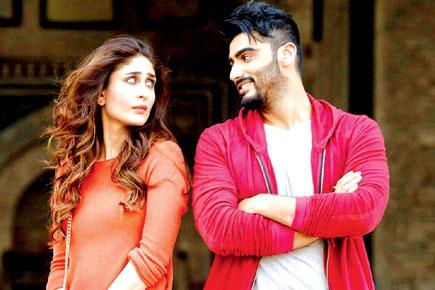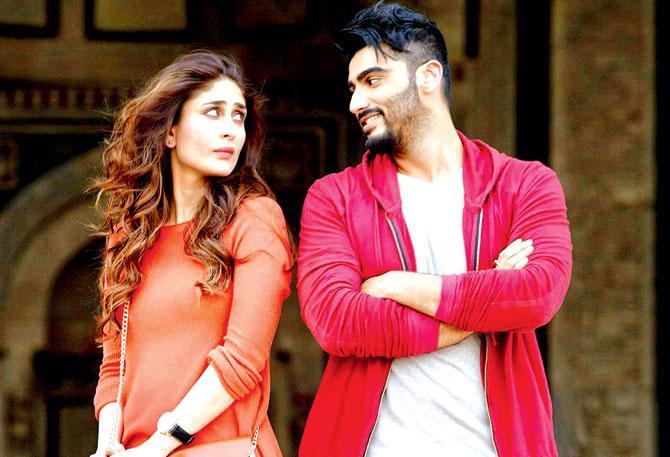To see R Balki's Ka and Ki is to see a gigantic missed opportunity, both politically and artistically, but also, to see that these two ambitions — the political and the creative — are intertwined. Both require the power to reimagine forms, social or artistic, with genuine insight

Kareena Kapoor and Arjun Kapoor play a couple in Ki & Ka
 To see R Balki's Ka and Ki is to see a gigantic missed opportunity, both politically and artistically, but also, to see that these two ambitions — the political and the creative — are intertwined. Both require the power to reimagine forms, social or artistic, with genuine insight.
To see R Balki's Ka and Ki is to see a gigantic missed opportunity, both politically and artistically, but also, to see that these two ambitions — the political and the creative — are intertwined. Both require the power to reimagine forms, social or artistic, with genuine insight.
In the film Arjun Kapoor and Kareena Kapoor — Ka and Ki respectively — switch gender roles. Which is to say, she is ambitious, career-driven and aggressive and works outside the house while he is supportive, house-proud, creative and a homemaker. A shift in this power balance leads to certain tensions and resolutions.
ADVERTISEMENT
Some things in the film are certainly a step ahead of the mainstream gender discussions. For instance, Swaroop Sampat's hospital bed thesis speech where she tells Ki, weeping with self-recrimination: we're all capable of being jerks and the power structures of patriarchy makes those in power bigger jerks. But we're also a work in progress and the feminist journey is about constant self-questioning, not pre-fabricated perfect beings.

Kareena Kapoor and Arjun Kapoor play a couple in Ki & Ka
There's also an important comment about how most people like equality in theory, but most people can't handle it in practice and the sense that society won't change until men change too. But, eventually, the film keeps jogging in small circles, becoming uninvolving and repetitive, not developing its argument much.
What's true for the intellectual framework of the film is true for its form too. The title implies that Ka and Ki should be seen as types in a film which wants to be, not a narrative, but a thought experiment: what if men did what women do and women did what men do? Like a nukkad natak, or rather, a corporate training video, the film keeps presenting us with scenario upon scenario for this behavioural discussion. But it ends up informing or intriguing us about as much as a bad street play or training video.
A didactic film is not inherently a bad thing. It could even have been audacious in these times when anodyne, goody-two-shoes three-act structures rule our screens. But to make a polemical form succeed you really need to have something radical and expansive to say. Rajkumar Santoshi's Lajja is a successful example of such a Hindi film. Ka and Ki is an example of how many advertisement films put together do not make a feature.
This odd creative and political paralysis of the film lies in its inability to be radical, while wanting to have the cool quotient of being radical. This is quite representative of new marketable ideas of equality, which breaks radical questions down to a series of consumable behaviours and online activities without really tackling fundamental structures.
There is a kind of guy who enjoys the reputation of being a maverick. This reputation usually rests on his disregard for corporate dressing and norms, free use of profanity and casual talk about sex (it's just a chaddi check, you know). He thinks these things make him cool, but they really make him passé and expose him as limited and provincial in mindset. But this guy is always telling you how things really are, including in your life.
He may be occasionally fun, and even possess a brilliance in some areas, but mostly, his lack of curiosity makes him a bore, unless you just worship power and like being around it. If that guy were a film, it would be Ki and Ka — a film so sure it is cool, it is embarrassingly uncool, but worse, so sure it knows all the answers that it doesn't genuinely care about our real questions about the messy, messy, business of reformulating gender.
Paromita Vohra is an award-winning Mumbai-based filmmaker, writer and curator working with fiction and non-fiction. Reach her at www.parodevipictures.com
 Subscribe today by clicking the link and stay updated with the latest news!" Click here!
Subscribe today by clicking the link and stay updated with the latest news!" Click here!







